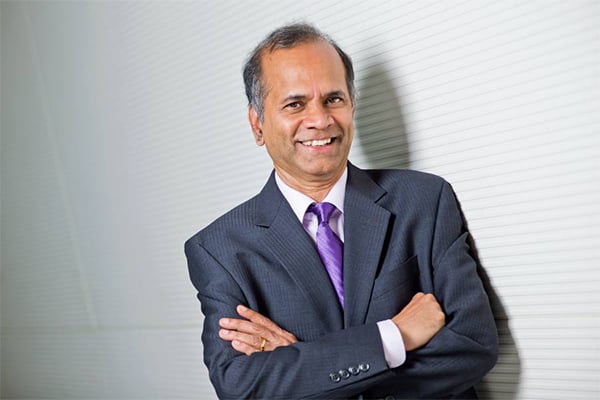Bloomberg Distinguished Professor Rama Chellappa joined the Department of Biomedical Engineering with a joint appointment in the Department of Electrical and Computer Engineering in the spring of 2020. In this interview, he discusses his inspiration for pursuing a career in engineering, his research in computer vision and medical imaging, his goals for the future, and how he enjoys spending his time while outside the lab.
What made you pursue a career in engineering?
The Apollo 11 moon landing mission inspired me to pursue engineering. Actually, I was glued to the family radio and listened to the live broadcast of the landing on the moon. I also watched a documentary about the landing at the auditorium in the U.S. Consular Office in Chennai, India. This spectacular achievement motivated me to pursue engineering.
Why did you choose Johns Hopkins BME? What are you looking forward to most?
I have been interested in BME since my undergraduate days, when it was called bionics (Biology + Electronics). For my final year capstone project, my classmate and I built an implantable pacemaker. During my academic career, I have investigated many signal and image processing methods for estimating intramuscular signals, markerless motion capture for diagnosing movement-related disorders, medical image reconstruction, and registration and segmentation. My two children are doctors and I have had many opportunities to discuss with them the role of engineering in medicine.
Johns Hopkins BME is uniquely placed in schools of engineering and medicine, which has fostered tremendous collaborations between faculty in engineering and medicine. Johns Hopkins BME is the top ranked program in the world. With joint appointments in the departments of Electrical and Computer Engineering and Biomedical Engineering, I will be able to pursue collaborative research efforts that bridge these disciplines. One of my current areas of research, Artificial Intelligence (AI), is expected to play a major role in medicine and healthcare. I am looking forward to working with faculty members and researchers in BME and other departments in the School of Medicine in developing AI-based diagnosis and treatment methods for a wide range of diseases that will impact a large number of patients.
Can you give a brief overview of your current research?
My current research is mainly focused on developing methods for many computer vision and medical imaging problems. We are developing methods for medical image reconstruction, object/face/action detection, tracking and recognition from images and videos, 3-D modeling, defending AI systems from adversarial attacks, and domain adaptation and generalization. These methods have applications in medicine.
Have you ever experienced a “eureka moment?”
When I was a graduate student, I came to realize that novelty is the most important ingredient in research. I value a novel experiment as much as I value a new theorem! I prefer a small progress on a very challenging unsolved problem than more progress on a well-understood and worked-on problem.
What do you consider your biggest research accomplishment so far?
The brilliant doctoral students I have supervised.
What impact would you like your work to have?
I would like to help in grooming the next generation of scientists and engineers who will develop novel AI-based solutions to improve diagnosis and treatment of a wide range of diseases, and build intelligent engineering systems for different applications.
What are your goals for the future?
I would like to initiate active collaborations with medical researchers, and explore the impact of AI on pathology, radiology, and other specialties in medicine.
Do you have any career advice to offer to current students?
Be passionate about learning and your work. Great achievements do not come easily. Live with the problem you are working on until you solve it. Ideas may come from anywhere, anyone, and at any time. Be a good receptor of ideas. Be open to collaborating with others.
What do you enjoy doing outside the lab?
I enjoy watching cricket games, listening to classical music, taking long walks, and practicing yoga. I also enjoy cooking healthy vegetarian meals for my family and friends.
Is there anything else you would like to share?
I am fond of good coffee! Converting coffee to good research papers is a beautiful thing!

